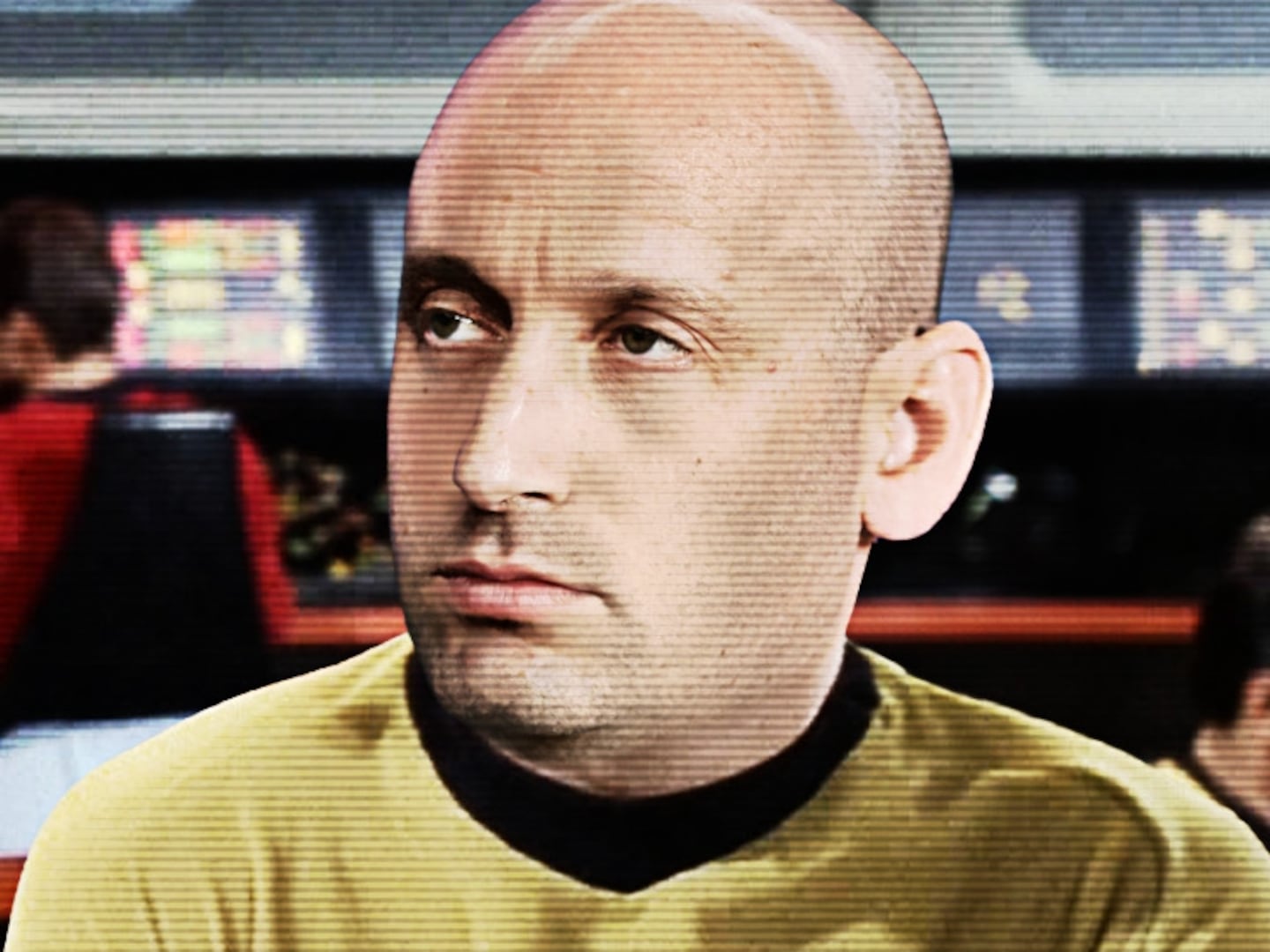The fall movie season kicks off this weekend with the limited release of The Master, Paul Thomas Anderson’s drama possibly inspired by the life of Scientology founder L. Ron Hubbard. Distributed by Oscar guru Harvey Weinstein, the film stars Philip Seymour Hoffman as Lancaster Dodd, a mystic figure who imposes his obscure teachings—dubbed The Cause—to a disillusioned World War II Navy veteran prone to fits of rage, played by Joaquin Phoenix.
The Master is not only being hailed as one of the finest works of Anderson’s career, which includes Hard Eight, Boogie Nights, Magnolia, and There Will Be Blood, but also as an Oscar frontrunner. But is all the critical hype overblown? Ramin Setoodeh hated The Master. Marlow Stern loved it. Here, they debate the merits of the film.
Ramin: The critics are salivating over The Master, Paul Thomas Anderson’s new allegedly-inspired-by-Scientology drama (that has little to do with Scientology), already crowning it as the greatest film of the year. But I’ll tell you what: The Master is a disaster. It’s a long, boring, emotionally grueling movie that will leave most audiences cold, with no payoff. It’s difficult to really describe the film, but the best I can do is to say it’s like a mashup of Tree of Life with The Iron Lady. Doesn’t that sound entertaining?! Go buy your tickets now! Throughout the showing I attended, I was less interested in what was going on on-screen—I was more fixated on the audience. Were they as underwhelmed as I was? I wanted to take a nap.
Marlow: While I’m pretty sure filmmaker Irwin Allen (The Poseidon Adventure) would take issue with your label, since it comes dangerously close to infringing on his “Master of Disaster” moniker, I’d have to respectfully disagree with your assessment. Firstly, PTA’s film seems to have a heck of a lot to do with Scientology. Let’s tackle this. The life of Lancaster Dodd, the mystic leader played by Philip Seymour Hoffman, is a virtual carbon copy of Scientology founder L. Ron Hubbard, as Scientologist Marc Headley, who was counseled by Tom Cruise himself, wrote for us, and his “processing” sessions—where a subject travels back in time through their memories to recount past traumas—parallels the concept of “auditing” in Scientology. But the thing that struck me as most similar to Scientology is how the film deals with the not-so-latent homosexuality in Dodd. Hubbard posited that homosexuality was a “perversion” and that Scientology could help raise people out of the “low emotion” that “produces it.” There are numerous scenes in The Master that examine this, in particular Dodd’s relationship with Freddie Quell (Joaquin Phoenix). Dodd seems to be sexually attracted to Quell’s animalistic nature, e.g. that scene where they’re wrestling with each other on the front lawn after Quell is released from prison, or the scene where Dodd’s wife, played by Amy Adams, gives him a handjob, along with a spiel about “cumming for her” and eradicating himself of negative (read: homosexual) thoughts. Oh, and doesn’t the husband of Dodd’s daughter seem rather… effete? Which explains why she, too, is attracted to Quell, who is pure testosterone.

Ramin: You aren’t fighting fair. Your description of all these scenes is presented in a logical, coherent, linear order. The Master is not that. It’s told in stream of consciousness bursts. The action doesn’t build. It’s hard for me to talk about story when there is no story. And I want to make that clear to people who are about to shell out $16 (or whatever insane amount it costs to go to the movies now) to see The Master, because of all the great reviews. This is more of an experimental film than anything Paul Thomas Anderson has done. Yes, there are scenes that echo Hubbard’s life biography, even though the director seems too jittery to actually cop to that. But there is no progression. There is no narrative. The acting exists in a self-contained bubble of Phoenix yelling at Hoffman and Hoffman yelling at Phoenix, and more yelling. Anderson, one of Hollywood’s gutsiest directors, just pushes the material too hard—and he goes off the deep end. More than anything else, The Master reminds me of one of those late, bad J.D. Salinger short stories that abandoned character for rambling dictums on Zen Buddhism.
Marlow: I thought the film was far from experimental. PTA, first and foremost, exhibits a mastery of form and composition. The colors, lines, and shapes that permeate the film are truly a sight to behold. It’s the first film in a decade (besides Samsara, also in theaters) shot entirely in beautiful 70mm—a wide, high-resolution gauge typically reserved for massive set pieces in Christopher Nolan films, and PTA’s Kubrick-esque tracking shots are once again in play. I think some are taking issue with the film because there’s no big “I DRINK YOUR MILKSHAKE!” payoff. No catharsis. It’s not tied up in a bow. It’s an epic battle of wills between Dodd, or the Superego, and Quell, the uncontrolled id (in Freudian terms). It’s about how man deals with his animalistic nature, as well as how damaged souls—in the form of WWII Navy veteran Quell—can be indoctrinated into a manipulative religious sect. It actually reminded me a lot of Charlotte Perkins Gilman’s famous 1892 short story The Yellow Wallpaper, about the androcentric hegemony (*exhale*) of the medical profession back then (that women’s realities didn’t jive with the “reality” they were forced to conform to). It’s about a woman who’s diagnosed with “a nervous condition” (like Quell in the film) and is locked in an attic by her physician-husband and the isolation drives her crazy; she starts to imagine things. With Freddie, he not only seems to be suffering from crippling PTSD, thus struggles to conform to society (violent outbursts), but it’s also revealed during “processing” that he was molested by his aunt. So, when Dodd confines him in rooms—like in the scene where, in an apparent ode to rapper Lil Jon, he makes Quell repeatedly walk from the “window to the wall”—he is manipulating Quell’s reality and infantilizing him. By the end of the film, Quell has been so psychologically battered and infantilized that he’s basically reborn. We see him lying on the beach next to a sand sculpture of a naked woman, staring up at her breasts (which book-ends with a scene earlier in the film where he basically rapes the same sand sculpture as his Naval midshipmen look on).
Ramin: And then the flying frogs fell to earth. But can we at least agree this is by no means Anderson’s greatest achievement. The Master isn’t a masterpiece. What did you think when the closing credits rolled? The feeling, for me, could best be described through the word huh? I think you can also agree with me that there will be blood at the concession stand: a gap between the critical enthusiasm for the film and what the public thinks.
Marlow: I’m not sure if it’s his best work … yet. I’m still “processing” it (sorry for that). But I do firmly believe that The Master is a great film by a director in complete command of his craft. It’s a fascinating meditation on damaged souls, cults, psychology, and man’s (oft corrupt) pursuit of greatness. I walked out of The Master still thinking about it and analyzing it, and I wanted to see it again. It’s PTA by way of Ophüls from a technical standpoint, and there’s no massive emotional payoff, so many audience members who are used to their films ending neatly will be turned off. I don’t count myself among them. Sure, this film probably won’t rack up blockbuster numbers at the box office, but many great films don’t. Didn’t The Hurt Locker make like … $20 million stateside? It’s a difficult sit for some because it’s a challenging, incredibly ambitious film that tackles some big questions and leaves it to the viewer to answer many of them. But any narrative issues aside, it’s worth seeing for Hoffman‘s and Phoenix‘s performances, which are both outstanding. Phoenix, especially, delivers one of the most bizarrely brilliant turns I’ve seen in quite some time. His Freddie is so wild and unpredictable, you have no idea how he’s going to act in any given situation. I can’t remember the last time I’ve witnessed a character that constantly had me on the edge of my seat like that—perhaps Day-Lewis’s Plainview in There Will Be Blood. With his hunched posture and internalized ferocity that often boils to the surface, he’s like a cross between Billy Bob Thornton in Sling Blade and Harvey Keitel in Bad Lieutenant. It’s a great performance that will be awarded with an Oscar nod. It should also be noted that Amy Adams is fantastic as Hoffman’s Lady Macbeth–like wife who eggs him on, and Jonny Greenwood’s score is absolutely mesmerizing.
Ramin: Amy Adams was better in Enchanted.
Marlow: Ha. I liked Enchanted, too.
Ramin: Philip Seymour Hoffman seemed to be doing his scenery-chewing act from Doubt, where he played another religious figure. Phoenix’s war veteran is at times supposed to be delusional, but one of the many places where the movie lost me was with its sudden leaps from reality. For instance, I had no idea what the purpose of the scene was where Phoenix imagines everybody at a party naked (and we see all their sagging, wrinkled bodies). It actually plays to a point that our friend Sasha Stone observed when it came to reactions to The Master. Some of the detractors of The Master—and I’m not the only one—are suggesting a kind of Emperor Has No Clothes phenomenon. See, there’s nothing there! Since everybody has such a vastly different reading of what The Master is about, that to me suggests a shortcoming on behalf of the filmmakers. Even they don’t know what they are trying to say.
Marlow: I saw some parallels between Hoffman’s Dodd and his priest in Doubt in that they’re both fairly contained performances save a few defensive outbursts when people call each character out on their gaping logical holes. I wouldn’t call it scenery-chewing by any stretch. This is a clash of two acting titans as well as two disparate personalities, and I found it thoroughly engrossing. The “processing” scene between Hoffman and Phoenix, with the vein in Phoenix’s head about to burst, belongs in the pantheon of great PTA scenes, alongside the lengthy pool-tracking shot in Boogie Nights, the “I’ve abandoned my child!” scene in There Will Be Blood, and the scene where Tom Cruise’s womanizing bastard breaks down in front of his dying father in Magnolia. On the subject of Quell, we are of course viewing this film from the perspective of an unreliable (unstable) character in Freddie, so that certainly adds to the film’s narrative mystique, a la Lynch’s masterpiece, Mulholland Drive. But aren’t the best works of art, whether it be film, television, painting, etc.—open to vastly different interpretations? I don’t think this denotes any form of shortcoming on behalf of the artist; rather, in the case of The Master, I believe it means that PTA has made a film that will be analyzed and studied by scholars for years to come.







